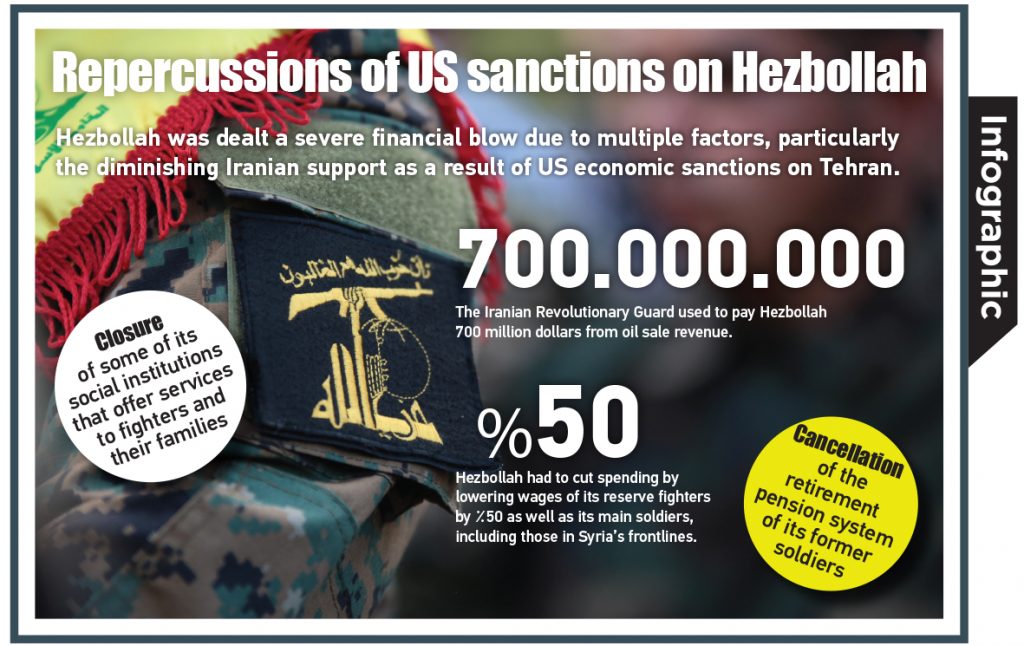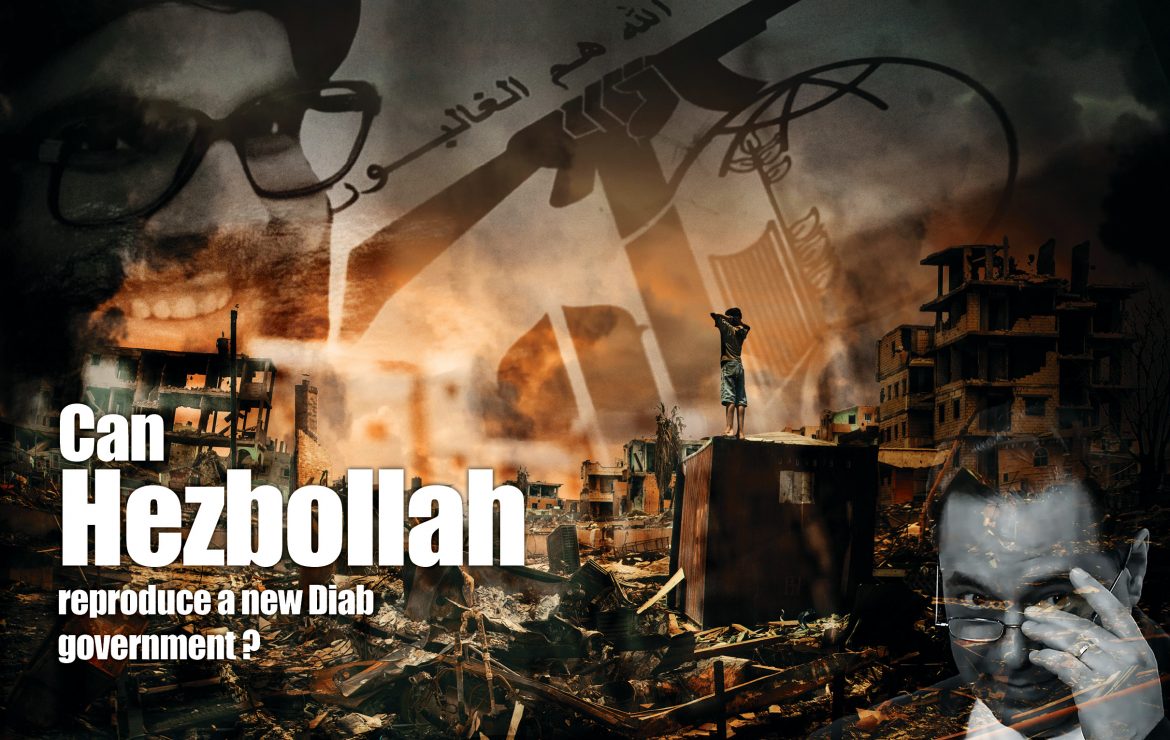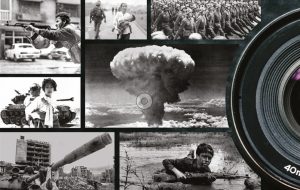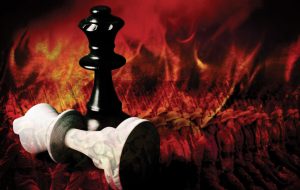Talks are underway to form a new Lebanese government. Despite the fact that the resignation of Prime Minister Hassan Diab came on the back of mounting street protest ascribing responsibility to the government for the Beirut port blast and the economic meltdown, the current consultations for a new cabinet have unveiled Hezbollah’s quest for hegemony.
Iran is worried that Hezbollah may lose its grip on the future Lebanese government. This came to the fore during a visit by Iran’s Foreign Minister Mohammad Javad Zarif to Lebanon on August 14, 2020, at a time Washington was seeking to impose more sanctions on Hezbollah and its allies to weaken its grip on the Lebanon’s cabinet. Meanwhile, France is adopting a milder position advocating the involvement of all political parties in a new government with Hezbollah keeping its role.
These new developments take place at a context marked by a deterioration of the Lebanese economy plagued by structural dysfunctions in addition to the repercussions of the coronavirus crisis and U.S. sanctions. Added to this the devastating explosion in Beirut’s port. These crises put the economy on the verge of collapse, unless the country obtains support from the International Monetary Fund (IMF).
The present analysis highlights indicators showing cracks within Hezbollah’s government prior to the Beirut port blast. It also shows the dimensions of the U.S. policy towards the party which aims at stemming its funding sources. The analysis concludes by tackling future scenarios for the new Lebanese government.
Cracks within Hezbollah’s government:
The Beirut port blast compelled the pro-Hezbollah government led by Hassan Diab to resign amid growing popular protests. But, prior to the explosions, observers of the Lebanese political scene considered that the government has been struggling to stay afloat amid rife internal crises evidenced by the following indicators:
- The unraveling of the Lebanese government: Foreign Minister Nassif Hitti quit the government on August 3, deploring, in a resignation letter, that “Lebanon today is sliding towards becoming a failed state,” saying it was not possible for him “ to fulfil his duties in such historical decisive moments in the absence of a vision for Lebanon as I believe in it… and in the absence of a real will to achieve a comprehensive structural reforms wanted by our national society and which the international community are calling on us to do.”
- Exacerbating economic crisis: the Lebanese state has sufferedg from an acute economic meltdown which the government failed to address. More than half of the Lebanese people live below the poverty line, Economy and Trade Minister in Diab’s government, Raoul Nehme, said in July 2020. Its debt to gross domestic product (GDP) ratio soared to 152% in late 2019, making it the third most indebted country in the world. Interest payments consume almost half government revenue. June inflation surged to 90%, while the local currency devaluated by 80% since September, due to a shortage in US dollars, which, in turn, led to the disappearance of medicine in pharmacies and daily consumer products as well as soaring prices of other products such as meat and cereals. Unemployment worsened from 25% in October 2019 to 32% in May 2020. The failure of the government to redress the economy triggered a collapse of its popularity and destroyed hopes in its ability to reform.
- Foot-dragging on economic reforms: The Lebanese government was negotiating a $10 billion loan with the IMF, but Hezbollah refused the deal citing concerns over national sovereignty, despite the presence of its representatives in a meeting between the government and IMF officials. Given the deterioration of the economic conditions and mounting street resentment, Hezbollah has no other option but to accept negotiations with the IMF which conditioned support to the government with financial and political reforms. Such demands ignited fears of Hezbollah in view of its involvement in corruption and money laundering. Diab’s government has quit without implementing any of the IMF conditions due to Hezbollah hesitations.
- Repercussions of US sanctions: Hezbollah was dealt a financial blow due to several factors, chief among which the diminishing Iranian support due to U.S economic sanctions on Tehran. The Iranian Revolutionary Guard used to pay Hezbollah 700 million dollars from oil sales. Hezbollah had, therefore, to cut spending by lowering wages of its reserve fighters by 50% as well as its main soldiers, including those in Syria’s frontlines, in an indicator of worsening financial conditions. The party also closed some of its social institutions that offer services to fighters and their families and canceled the retirement pension system for its former soldiers.
Washington targets Hezbollah:
As it seeks to contain the Iranian influence in the Middle East, the United States focused its efforts to undermine Hezbollah, one of the major proxies of Tehran in the region. In this respect, Washington took the following measures:
- Imposing sanctions on Hezbollah: The U.S. Department of the Treasury has sanctioned three Hezbollah officials describing them as “global terrorists.” Sanctions were also imposed on 12 Lebanon-based entities linked to the Martyrs Foundation as part of a network that supports the party. Such measures are meant to stem the flow of money to Hezbollah, thus aggravating its economic crisis as Iranian funding dipped. Washington has also waged a diplomatic campaign in Europe and Latin America to classify the Lebanese organization as “a terrorist group” in order to block it’s the funding it receives from charity associations affiliated to it in Europe and also to hit its ability to use criminal networks in Latin America, particularly in Venezuela, which engage in drug and cocaine trafficking, one of the main source of income for the pro-Iran party.
- Preparing sanctions on Hezbollah’s Christian allies: In the wake of the resignation of Diab’s government, the U.S. is preparing economic sanctions on prominent Lebanese politicians and businessmen linked to Hezbollah due to their role in strengthening the party’s foothold. Through these sanctions, the US aims to influence the process of the Lebanese government formation. It is known that the Lebanese political system is based on consensus between the different sectarian leaders and between regional powers. The outgoing government deviated from that rule because it was under the influence of Hezbollah with a pro-Iran bias in the region. It even tried to promote Iranian control in the region despite opposition of several political powers.
The US sanctions are also meant to shape the formation of the Lebanese government by keeping Hezbollah away from influencing it. Washington accuses officials of the Free Patriotic Movement, notably President Michel Aoun and his son-in-law and former Foreign Minister Gebran Bassil, of helping Hezbollah strengthen its grip over Lebanon through giving a Christian cover to an Iran-funded Shi’ite militia.
The Trump administration also seeks to use sanctions as a key instrument to exert ultimate pressure on Iran and on its armed proxies, notably Hezbollah. It is expected that these sanctions will include a ban on Lebanon’s access to IMF support, until Hezbollah is sidelined in the new government.
The second goal from imposing sanctions lies in pressuring the Lebanese government to fight corruption in order to weaken Hezbollah who relies on corrupt officials to launder its foreign sources of illegal money.
- Using Hezbollah’s involvement in Hariri’s assassination: The Special Tribunal For Lebanon handed down a guilty verdict for a military and political leader in Hezbollah’s militia, Salim Ayyash, for the assassination of former Prime Minister Rafik Hariri in 2005 after a trial that lasted 6 six years. Judge David Re said there was no doubt that he was guilty, adding “Ayyash has a central role in the execution of the attack.”
The judges affirmed that there was no evidence for the involvement of the leadership of Hezbollah and Syria, although they noted “the existence of motives” for such an act. The court’s system indicts only those responsible for the attack and does neither treats the party as a political group and neither indicts the state and its president. From another perspective, this verdict has acquitted Hezbollah on ground of the absence of proof, while all evidence points to its involvement. Political judgement shows that Ayyash could not have conducted the assassination without guidance from Hezbollah leadership, which has an interest in the killing of Hariri. Moreover, the assassination had a political character, as there was no personal problem with Hariri that would push Ayyash to assassinate him. Hezbollah is expected to withhold from handing Ayyash over. This would condemn the party and offer one more evidence of its involvement in the killing of the former Lebanese Prime Minister. The US has therefore more cards to use to put pressure on Hezbollah.
The verdict would also further undermine Hezbollah’s popularity as protesters ascribe responsibility for the blast to the party which unofficially controls most operations in the port. Official customs, for instance, do not have power to inspect thus making Hezbollah responsible even if the explosion was due to storage negligence.
New government scenarios:
In light of the pressure on Hezbollah, future scenarios for the formation of the new government are:
- Reproducing Diab’s government: This could take place if President Michel Aoun and Hezbollah replicate the same outgoing government by assigning a new government chief lacking national consensus. Such a scenario is unlikely as the U.S. continues to wave sanctions and as Lebanon seeks an IMF loan and struggles to rebuild the devastated areas of its capital after the port blast. But, reproducing Diab’s government will have a destructive impact in view of the economic crisis. Such a step would trigger the collapse of the economy and fuel a trans-sectarian public anger against the executive.
- Deadlock in forming a new government: This is expected in case the political lethargy lasts and negotiations hit a dead end in view of the difficulty in reaching an agreement between Lebanese political forces which would further aggravate the country’s economic turmoil and restore balance to its foreign policy away from taking sides in favour of major regional rivals. Such a scenario would, however, make it difficult for Lebanon to negotiate a lifeline with the IMF.
- Forming an independent government: A government of technocrats led by Saad Hariri has been raised as a possible solution backed by the US, France and Russia. But this government requires concessions from Hezbollah which is called upon to loosen its grip on the Lebanese government. The deteriorating economic conditions of the party and its faltering political popularity, particularly following the international court’s verdict on Hariri’s assassination, makes this scenario very likely.
The real impediment facing government formation lies however in the speech given by Saad Hariri after The Special Tribunal For Lebanon delivered its verdict. He said “no one can expect further sacrifices from us. Hezbollah has to make sacrifices after it became clear that one of the perpetrators belongs to it,” adding that vengeance has to be taken. Hence, the refusal of Hezbollah to hand over Ayyash could represent a factor hindering government formation.
To conclude, recent developments show the magnitude of the challenges facing the Lebanese government and that no Lebanese government can address them without support from the IMF, particularly at a context where the coronavirus crisis and the Beirut port blast have exacerbated the structural crisis of the Lebanese economy. This is one of the cards that Washington uses to prevent Hezbollah from maintaining its hegemony over the Lebanese government machinery.

» By: Dr. Shadi Mohamed Abd El Wahab security expert













